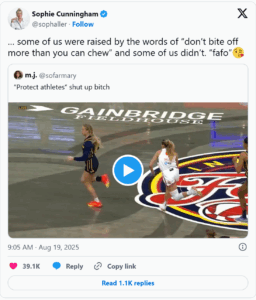In the hyper-visible arena of modern professional sports, an athlete’s career is defined by more than just statistics and championships. It’s a constant, precarious balance of peak physical performance, public relations, and navigating the treacherous currents of social media. For Fever guard Sophie Cunningham, a season-ending knee injury became the unfortunate catalyst for a firestorm that perfectly encapsulates this new reality—a complex battle involving player safety, league authority, and the brutal court of public opinion. Her cryptic but powerful message to an online troll, “fafo,” was more than a clapback; it was a declaration from a player pushed to the edge.
The saga began on the hardwood but quickly metastasized into the digital realm. After Cunningham crumpled to the floor during a game against the Sun, her sister, Lindsey, did what many frustrated family members now do: she took her grievances to social media. Her post on X was a direct shot at the WNBA, accusing the league of prioritizing fines over player safety and enabling “poor officiating.” It was a raw, emotional plea from a sister watching a loved one’s season and livelihood abruptly halt. But in today’s world, no criticism goes unchallenged. A troll emerged, dismissing Lindsey’s plea with a vile, misogynistic insult and using a video of Sophie’s past flagrant foul as evidence that she was unworthy of protection.

This is where the story pivots from a typical sports injury to a landmark case of the modern athlete’s dilemma. Injured and on the sidelines, Sophie Cunningham chose to engage. Her response, telling the troll not to “bite off more than you can chew” before signing off with the acronym for “F*** Around and Find Out,” was a stunning moment of defiance. It was the act of an athlete reclaiming her own narrative and defending her family, refusing to absorb the toxicity that has become a grim feature of online sports discourse.
However, this confrontation was not born in a vacuum. It was the culmination of a long-simmering feud between Cunningham and the league’s officiating body—a feud for which she has paid a literal price. The context provided by her actions over the previous month is crucial. On July 17, she was hit with a $500 fine for a seemingly innocuous TikTok. In the video, she silently lip-synced to a popular audio clip with the lyrics, “Stupid. Or is it, slow? Or maybe, useless?” The smoking gun was her caption: “@ some refs.” It was a clear, albeit creative, jab at the officiating, and the league’s disciplinary arm acted swiftly.

Just over a week later, on July 28, Cunningham escalated her critique. Using her own platform, the “Show Me Something” podcast, she spoke at length about her frustrations, calling the referees “so inconsistent.” This more direct, public condemnation of their performance earned her a much steeper penalty: a $1,500 fine. The message from the WNBA was unequivocal: public criticism of officiating will not be tolerated. This policy, common in professional sports leagues, is designed to protect the integrity of the game and the authority of its arbiters. But it also creates a high-pressure environment where players feel their legitimate concerns about safety and fairness are being silenced by financial penalties.
Viewed through this lens, the explosion following her injury seems almost inevitable. For months, Cunningham had been trying to voice her concerns through various channels, from satirical social media posts to direct podcast commentary, only to be systematically fined. Her sister’s post was simply the next escalation, a public airing of a grievance the league seemingly wanted to keep behind closed doors. The troll’s attack was the spark that lit the fuse, pushing Sophie to bypass the official channels that had failed her and confront the narrative head-on.
This incident highlights several critical themes in contemporary sports. First is the weaponization of social media against athletes, particularly women. The troll’s use of a past foul is a classic tactic—digging up “receipts” to decontextualize an athlete’s actions and invalidate their current position. The immediate resort to gendered insults is a stark reminder of the additional layer of abuse female athletes face.
Second is the evolving role of athletes’ families. Once silent supporters in the stands, family members like Lindsey Cunningham are now active participants in the public discourse, using their platforms to advocate, defend, and challenge league narratives. While this provides a powerful support system, it also exposes them to the same vitriol as the athletes themselves, complicating an already stressful environment.
Finally, and most importantly, is the fundamental tension between a league’s need for control and a player’s demand for a voice and a safe workplace. The WNBA is in the midst of a massive surge in popularity, bringing more fans, more money, and more scrutiny than ever before. With that growth comes the responsibility to manage the relationship with its star players, who are more empowered and outspoken than any generation before them. Fining players into silence may seem like an effective short-term strategy for maintaining order, but in the long run, it risks alienating the very people who make the league compelling.
Sophie Cunningham’s season may be over, but the conversation she has ignited is just beginning. Her story has transcended the box score, becoming a powerful symbol of the fight for accountability in professional sports. As she recovers from her injury, the league faces a recovery of its own—rebuilding trust with its players and proving that it values their well-being as much as its public image. The outcome of this standoff will have repercussions far beyond a single player’s career, potentially reshaping how athletes, leagues, and fans interact for years to come.